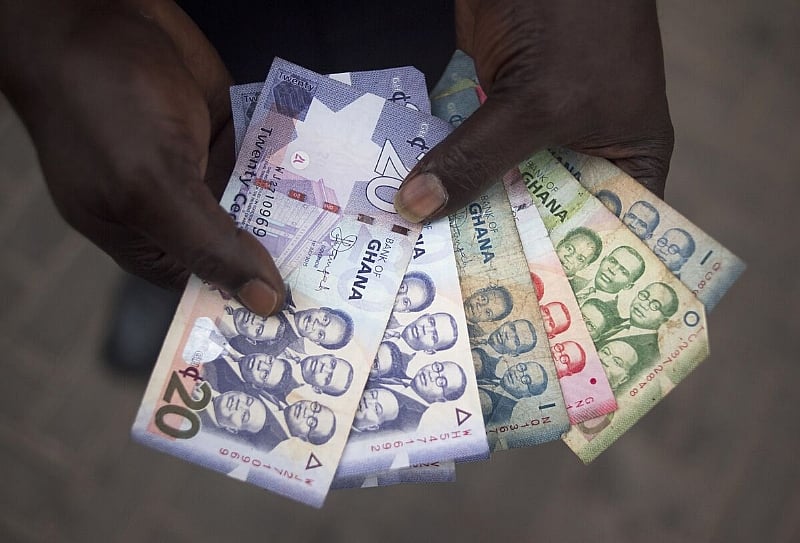The Ghanaian cedi experienced mixed performance against the US dollar on Saturday, January 11, 2025, showcasing a slight depreciation in the buying rate while appreciating in the selling rate. Specifically, the cedi weakened by 1 pesewa against the dollar in buying transactions, settling at GHS14.68, but gained 4 pesewas in selling transactions, reaching GHS15.16. This data, sourced from Cedirates.com, a reliable platform for currency updates in Ghana, provides a snapshot of the cedi’s performance in the broader market. Comparatively, forex bureaus offered less favorable rates, buying the dollar at GHS15.40 and selling at GHS15.80. This discrepancy highlights the variations in exchange rates across different segments of the currency market, with forex bureaus typically incorporating a margin for profit. The interbank rate, reflecting transactions between banks, stood at GHS14.74 for buying and GHS14.76 for selling the US dollar, indicating a slightly stronger cedi within the banking sector.
The Ghanaian cedi’s performance against other major currencies, namely the British Pound Sterling and the Euro, also displayed distinct trends. Against the Pound, the average buying rate was GHS17.90, while the selling rate reached GHS18.66. This suggests a relatively weaker cedi compared to the Pound. Similarly, the Euro traded at a buying rate of GHS14.95 and a selling rate of GHS15.64, indicating a stronger Euro relative to the cedi. The Bank of Ghana’s interbank rates for these currencies were slightly different, with the Pound selling at GHS18.00 and the Euro at GHS15.09. This variance reflects the dynamics of the interbank market, influenced by factors such as supply and demand and specific bank policies. The interbank rates often serve as a benchmark for other segments of the foreign exchange market.
Remittance services, such as LemFi and Afriex, offered competitive rates for transferring money to Ghana from the US and the UK. For dollar transfers, LemFi and Afriex provided rates of GHS14.70 and GHS14.95 per dollar, respectively. These rates are generally more favorable than those offered by traditional banks or forex bureaus, highlighting the advantages of using specialized remittance platforms. For Pound transfers, both services offered similar rates, with buying rates around GHS18.10 and selling rates around GHS18.75. This consistency suggests a competitive market for remittances in the Pound Sterling, benefiting individuals sending money to Ghana. Euro transfers through Afriex were priced at GHS15.58 per Euro, while LemFi offered a slightly more favorable rate of GHS15.20. These options provide Ghanaians with alternative avenues for receiving funds from abroad, often at more competitive rates than traditional channels.
The variation in exchange rates offered by different providers underscores the importance of comparing rates before conducting foreign exchange transactions. Whether purchasing foreign currency for travel, receiving remittances, or paying for international subscriptions, comparing rates can lead to significant savings. The Ghanaian cedi’s fluctuating performance against major currencies highlights the dynamic nature of the foreign exchange market and the influence of various factors, including market sentiment, economic indicators, and global events. Understanding these fluctuations and leveraging competitive exchange rates can help individuals and businesses manage their foreign currency needs effectively.
For individuals looking to pay for international subscriptions such as Netflix, Spotify, or Apple Music, both Visa and Mastercard offered a consistent rate of GHS15.84 per US dollar. This standardized rate simplifies transactions for users, providing clarity and predictability for recurring subscription payments. The availability of multiple payment processors with similar rates also fosters competition and ensures that consumers are not subjected to excessive charges for international transactions. The convenience of using established payment platforms like Visa and Mastercard for online subscriptions streamlines the payment process for users, offering a seamless experience for accessing global digital content.
In summary, the Ghanaian cedi exhibited a nuanced performance against major currencies on January 11, 2025. While depreciating slightly against the US dollar in buying transactions, it appreciated in selling transactions. The cedi’s performance against the Pound Sterling and the Euro reflected a relatively weaker position. Remittance services offered competitive rates for transfers from the US, UK, and Eurozone, providing cost-effective alternatives for sending money to Ghana. The standardized rates offered by Visa and Mastercard for international online subscriptions simplified payments for users. The overall picture highlights the dynamic nature of the foreign exchange market and the importance of comparing rates across different providers to secure the most favorable terms for currency transactions.


